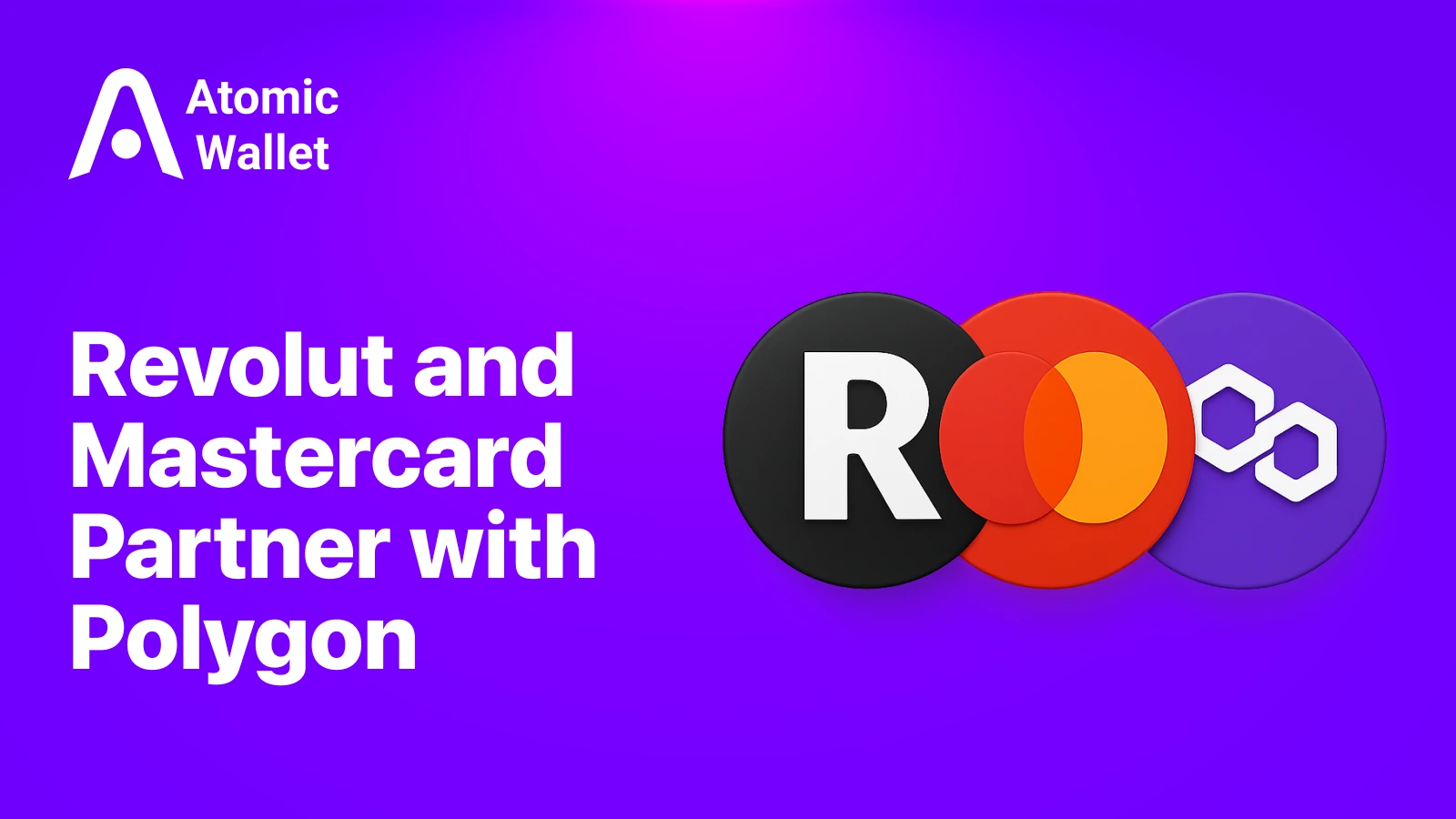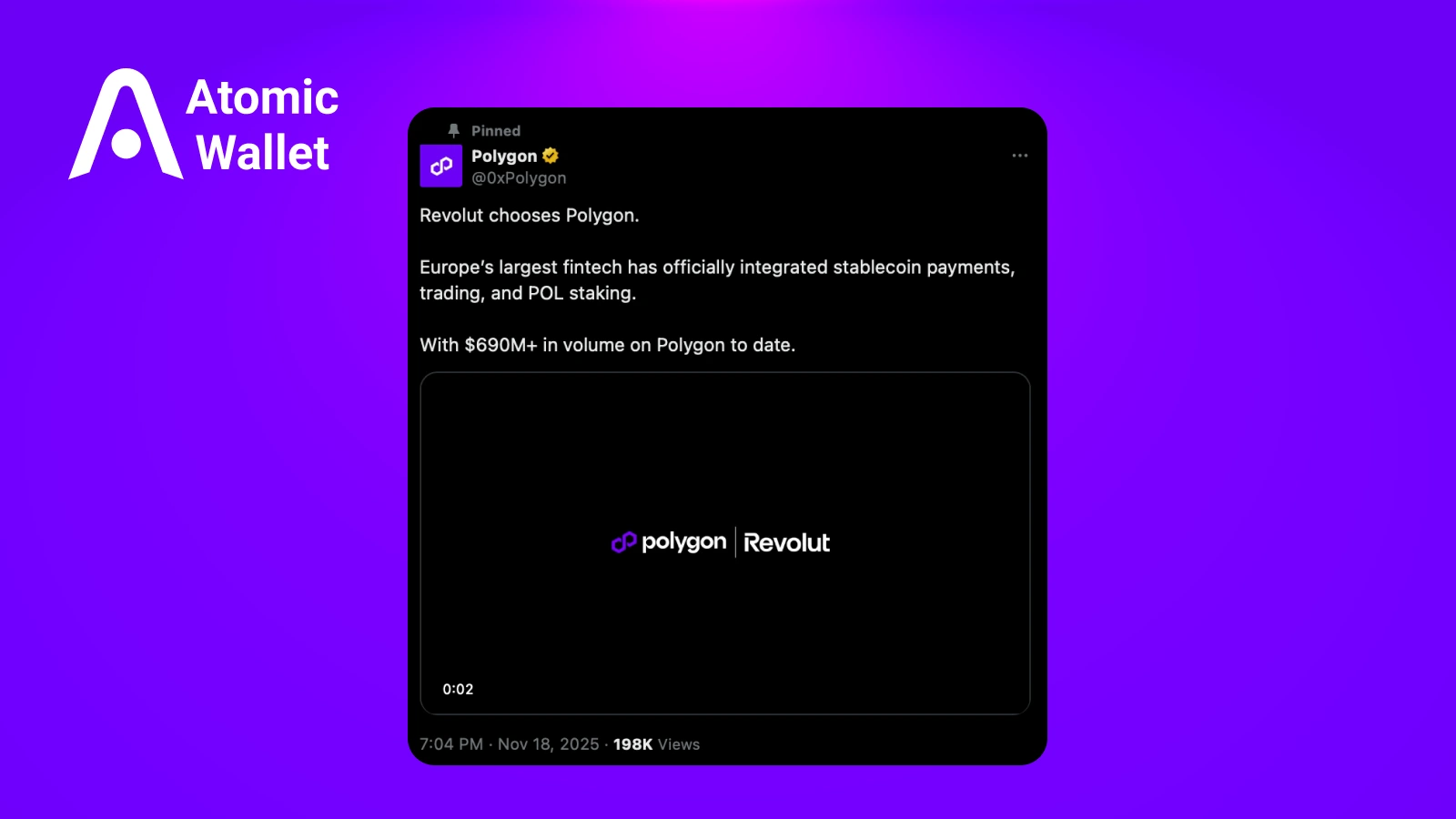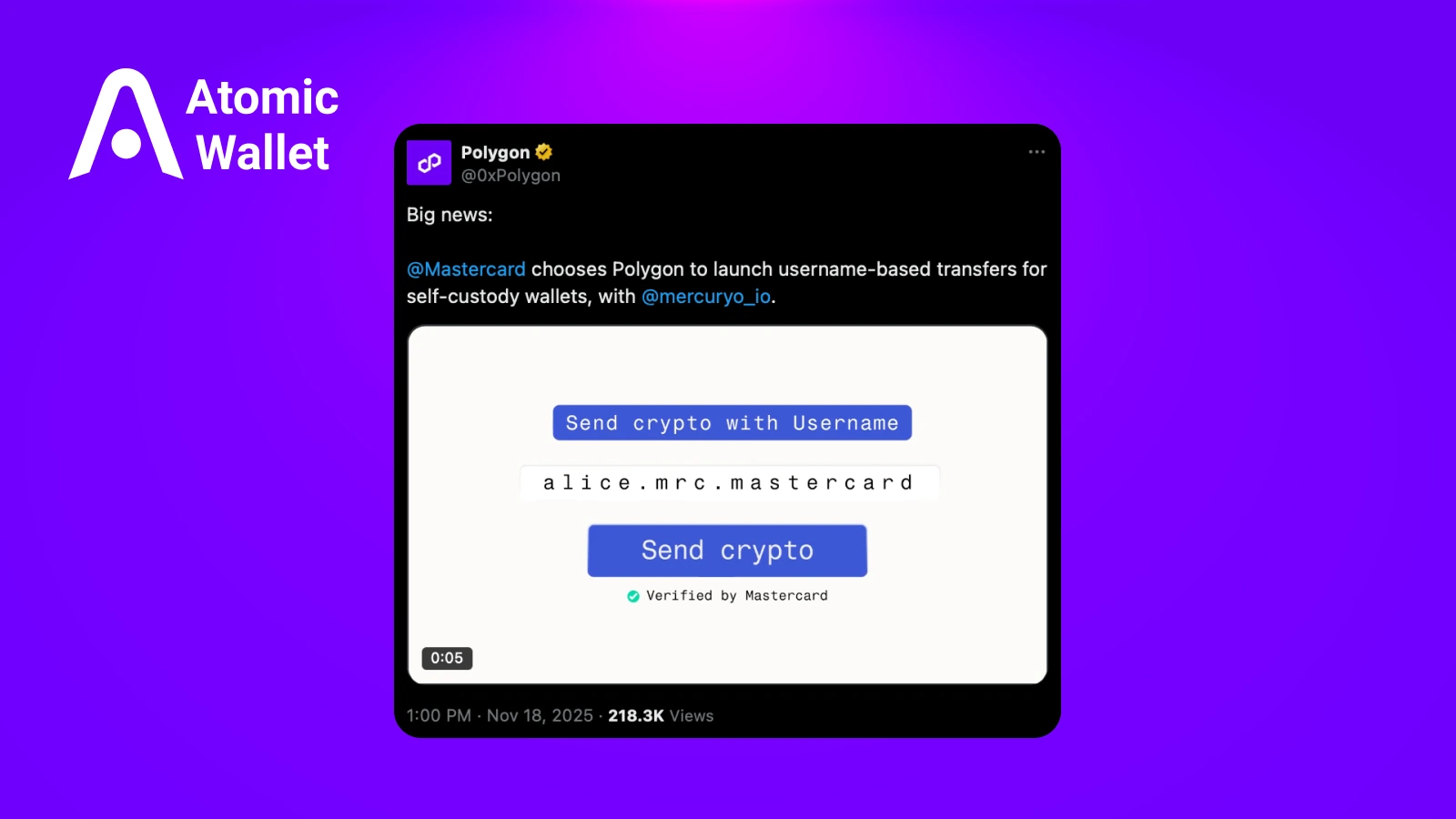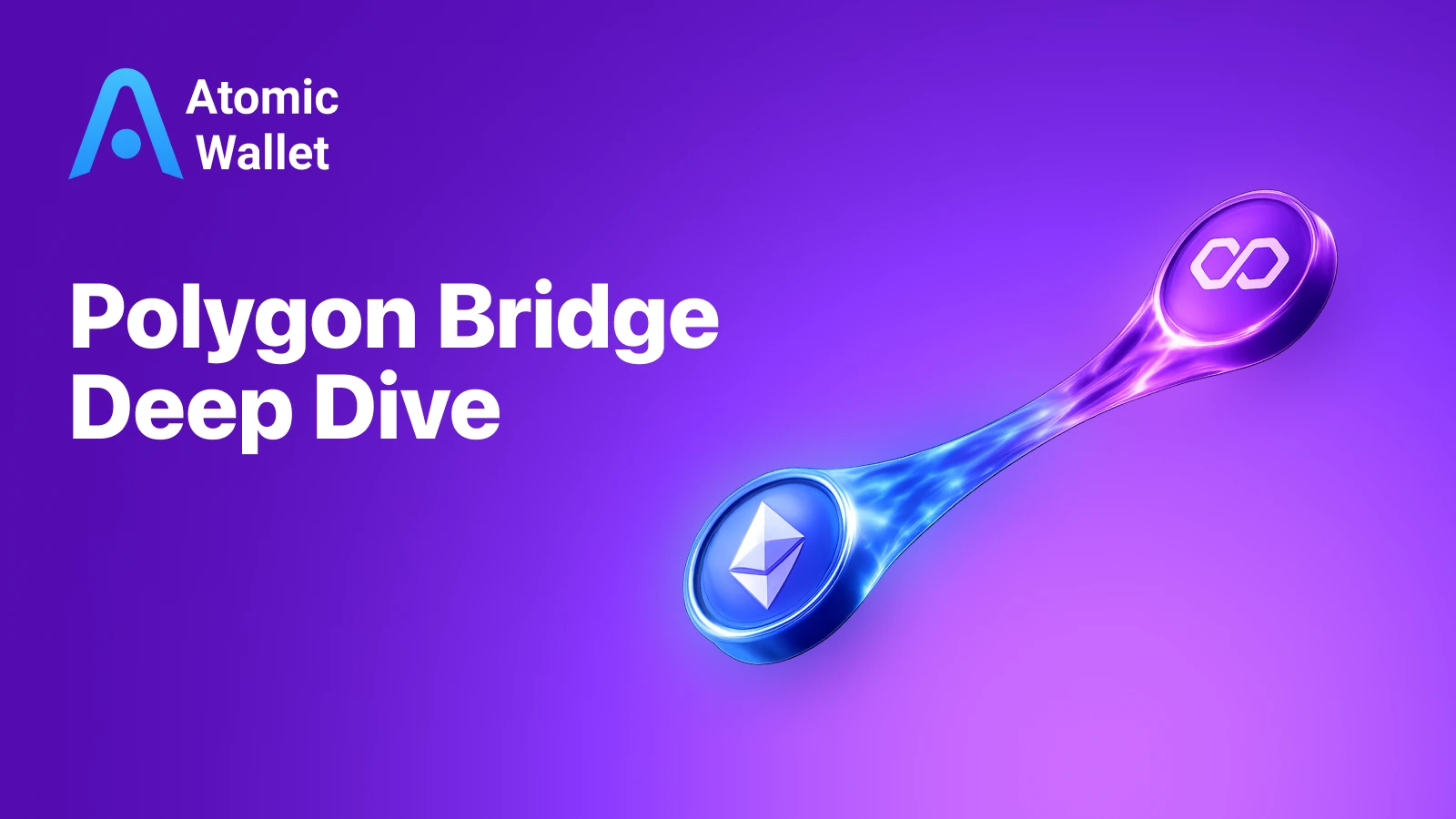Assets

Exchange

Buy Crypto




Revolut has partnered with Polygon to bring zero-fee remittances, POL staking, and crypto card payments directly into one of the world’s largest fintech apps. With more than 65 million users across 38+ countries, Revolut is integrating Polygon as its primary crypto infrastructure layer, already processing over $690 million through the network.
At the same time, Mastercard is adopting Polygon to enable crypto transfers using simple usernames instead of long wallet addresses. Together, these moves signal a major shift: Web2 fintech and global payment networks are now building directly on Polygon, accelerating mainstream adoption of crypto and on-chain money.
Revolut’s Polygon integration unlocks a new suite of on-chain financial features for everyday users. Stablecoin remittances on Polygon allow nearly zero-fee transfers across borders, giving a practical and cost-effective alternative to traditional payment rails. Within the app, users can also stake POL and earn rewards without leaving the familiar Revolut interface.
Crypto card payments are another key addition. Purchases made with the Revolut card can settle through Polygon’s high-throughput infrastructure, combining fast finality with low transaction costs. By using Polygon as its underlying engine for crypto transactions, Revolut brings scalable, user-friendly Web3 experiences to a global audience.

Polygon provides the scalability and low-cost settlement layer that makes Revolut’s new crypto features possible. The network is designed for high throughput and fast confirmations, allowing stablecoin transfers, staking transactions, and card payment settlements to move efficiently on-chain. Low fees ensure that remittances and micro-transactions stay affordable, even at high volume.
With Reserve and additional infrastructure partners supporting the technical flow, Revolut can route crypto activity through Polygon without relying on slow or expensive legacy rails. This setup delivers predictable settlement times, transparent on-chain execution, and a smoother experience for millions of users interacting with digital assets inside Revolut.
Mastercard is also building on Polygon through its Crypto Credential initiative, which allows users to send and receive crypto using simple usernames rather than long wallet addresses. After identity verification, each user receives a unique alias linked to their self-custody wallet on Polygon, making transfers more intuitive and less error-prone.
Polygon’s low fees and fast finality make it ideal for these human-readable transfers, enabling seamless crypto payments across wallets and services. By replacing complex addresses with verified aliases, Mastercard removes one of the biggest UX barriers in crypto and moves self-custody closer to mainstream usability.

Revolut’s integration with Polygon delivers a set of practical, everyday advantages for anyone using crypto. Zero-fee or ultra-low-fee remittances make it easier to send stablecoins across borders without paying high banking or exchange fees. POL staking inside the Revolut app gives users a way to earn rewards without needing separate wallets, platforms, or on-chain setup.
Crypto spending becomes more accessible through card payments that settle via Polygon’s fast and inexpensive infrastructure. With Mastercard’s username-based transfer system, users can avoid long wallet addresses and rely on simple aliases for sending and receiving crypto. Altogether, these features combine convenience, speed, and security in a single, familiar interface.
The partnership positions Polygon as a core infrastructure layer for mainstream fintech and payment networks. Revolut’s integration brings millions of users into daily contact with on-chain transactions, transforming stablecoins and crypto from speculative assets into practical tools for payments and transfers. Mastercard’s use of Polygon further validates the network’s reliability and UX capabilities, especially around verified identity and consumer-facing crypto solutions.
These developments signal a broader trend: global fintech platforms are increasingly choosing scalable, low-cost blockchains like Polygon to power their digital asset features. As remittances, card payments, and staking migrate on-chain, the gap between traditional finance and Web3 continues to narrow, creating new opportunities for users and developers across the ecosystem.
Users can take advantage of Revolut’s Polygon integration directly through the app. Stablecoin transfers on Polygon allow quick, low-cost remittances to supported regions, making cross-border payments far more efficient than traditional banking rails. POL staking is available inside the Revolut interface, enabling rewards without leaving the app or managing separate wallets. Crypto card payments work automatically in the background, with transactions settling through Polygon’s fast, scalable infrastructure.
Mastercard’s username-based transfers offer another layer of convenience. After completing identity verification, users receive a human-readable alias linked to their self-custody wallet. This alias can be shared just like a username, simplifying incoming and outgoing crypto transfers. Together, these tools make it easier for anyone to interact with stablecoins and other assets on Polygon without navigating complex wallet mechanics.
Integrating crypto with mainstream fintech comes with several considerations. Username-based transfers require identity verification, which may raise privacy concerns for some users. Stablecoin remittances and staking features depend on regional regulations, which can vary across jurisdictions and may affect availability or limits over time.
Technical risks also exist. While Polygon offers low fees and fast settlement, on-chain networks can experience congestion or smart-contract vulnerabilities. Users should be aware that staking POL involves exposure to market volatility. As with any financial service involving crypto assets, understanding the underlying mechanics and potential risks is essential before participating.
The partnership between Revolut and Polygon marks a major step forward in bringing on-chain finance to everyday users. Zero-fee remittances, POL staking, and crypto card payments introduce real utility for millions of people, while Mastercard’s username-based transfers push self-custody toward mainstream accessibility.
These integrations move crypto beyond speculation and into practical, daily use. Polygon continues to establish itself as a leading infrastructure layer for global payments, and Revolut’s adoption demonstrates how Web3 can seamlessly power modern fintech. As more services embrace on-chain rails, the next generation of digital payments is already taking shape.
Manage Polygon assets and explore the expanding on-chain payment ecosystem directly from your non-custodial Atomic Wallet.

Learn how Polygon Bridge works and move Polygon crypto like USDC Polygon between Ethereum and Polygon step by step.